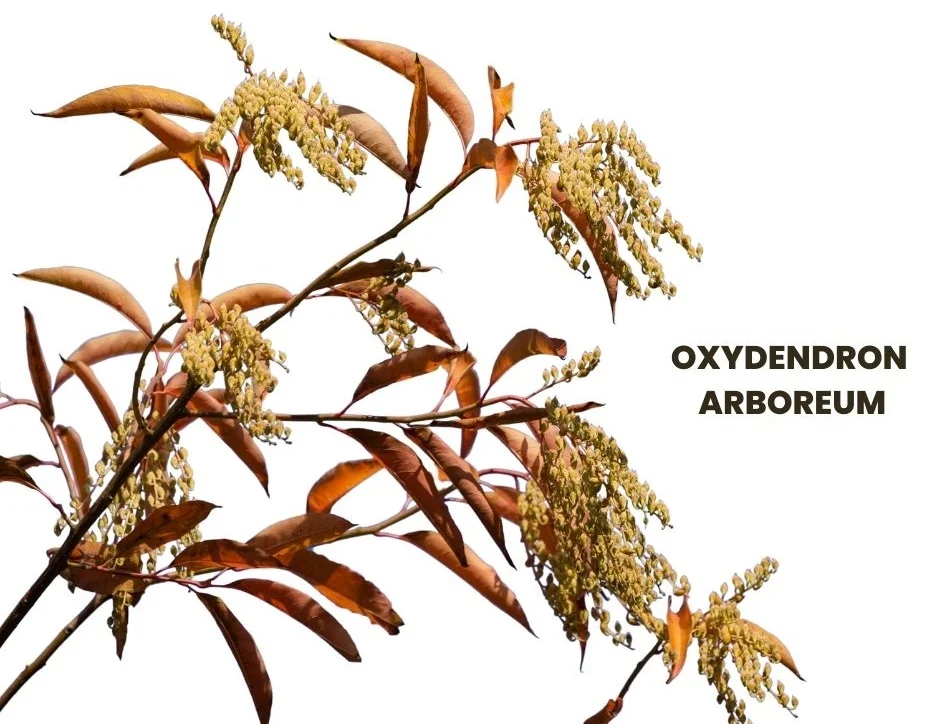Oxydendron arboreum, also known as the Sorrel-tree, is a homeopathic remedy used primarily for treating conditions related to dropsy (fluid accumulation), including ascites (fluid in the abdomen) and anasarca (generalized swelling).
It is particularly beneficial for patients with suppressed urine, deranged portal circulation, and prostatic enlargement.
The remedy also addresses urinary issues, such as vesical calculi (bladder stones) and bladder irritation, and provides relief for respiratory difficulties associated with these conditions.

SOURCE INFORMATION
Scientific Classification
- Kingdom: Plantae
- Order: Ericales
- Family: Ericaceae
- Genus: Oxydendron
- Species: Oxydendron arboreum
Common Name: Sorrel-tree
Origin
- Oxydendron arboreum is native to the eastern United States, particularly the Appalachian region.
- It is known for its distinctive sour-tasting leaves, which have historically been used in herbal medicine.
- In homeopathy, the plant’s properties are harnessed to treat conditions involving fluid retention, urinary issues, and circulatory problems.
DRUG PATHOGENESIS
- Oxydendron arboreum acts on the circulatory system, especially the portal circulation (the venous system supplying blood to the liver), leading to conditions such as ascites and anasarca.
- It also has a marked action on the urinary system, making it useful for treating suppressed urine, bladder irritation, and prostatic enlargement.
- The remedy improves urinary flow and helps dissolve or prevent vesical calculi (bladder stones).
- Additionally, it provides relief from respiratory distress that is often associated with these conditions.
KEY CHARACTERISTICS
Dropsy and Fluid Retention
- Effective in treating dropsy, which manifests as ascites (fluid accumulation in the abdomen) or anasarca (generalized body swelling).
- Particularly indicated when urine is suppressed, leading to fluid buildup in the body.
Deranged Portal Circulation
- Oxydendron arboreum is useful in conditions where there is deranged portal circulation, meaning the blood flow through the portal vein (which supplies blood to the liver) is obstructed or compromised, leading to conditions like ascites.
Urinary Issues
- The remedy is beneficial for prostatic enlargement, which can lead to urinary retention and discomfort.
- It also addresses vesical calculi (bladder stones) and irritation in the neck of the bladder, both of which can cause difficulty in urination and discomfort.
Difficulty Breathing
- Patients suffering from great difficulty in breathing (dyspnea) due to fluid retention or pressure on the chest can find relief from this remedy.
DETAILED ORGAN SYMPTOMS
URINARY SYSTEM
- Suppressed urine: The patient experiences reduced or no urine output, leading to fluid accumulation in the body (dropsy).
- Vesical calculi: The presence of bladder stones causes pain and irritation, particularly at the neck of the bladder, making urination difficult and painful.
- Prostatic enlargement: In cases of benign prostatic hypertrophy, the enlarged prostate presses on the bladder, causing urinary retention and discomfort.
CIRCULATORY SYSTEM
- Deranged portal circulation: This affects the liver’s blood supply and can lead to ascites and other forms of fluid retention.
- Dropsy: The remedy is used to treat generalized swelling (anasarca) or specific fluid accumulation in the abdomen (ascites), often due to poor circulation or kidney/liver issues.
RESPIRATORY SYSTEM
- Difficulty breathing: Patients with fluid retention often experience shortness of breath due to pressure on the lungs and chest.
MODALITIES
Worse
- Symptoms are aggravated by conditions that lead to fluid retention and circulatory stagnation, such as poor liver function or prostate enlargement.
Better
- Symptoms improve with increased urination, which helps relieve fluid buildup, and through supporting the portal circulation.
WHAT ARE MODALITIES IN HOMOEOPATHY?
RELATIONSHIP WITH OTHER DRUGS
Compare with,
- Cerefolius: Another remedy useful for treating dropsy, Bright’s disease, and cystitis (inflammation of the bladder).
- Apis mellifica: Useful for fluid retention and urinary issues.
- Solidago: Also useful for kidney issues, urinary retention, and fluid accumulation.
DOSE
- The remedy is typically used in mother tincture form or in lower potencies, with the dosage adjusted based on the severity of the condition.
- The tincture is taken until symptoms improve, and higher potencies may be considered for chronic cases.
Frequently Asked Questions (FAQs)
What is Oxydendron arboreum used for in homeopathy?
- Oxydendron arboreum is primarily used for treating dropsy (fluid retention), including ascites and anasarca, as well as urinary issues such as prostatic enlargement, bladder stones, and suppressed urine.
How does Oxydendron arboreum help with fluid retention?
- The remedy promotes urine production and improves circulatory function, especially in the portal vein, reducing fluid buildup in the abdomen and other areas of the body.
Can Oxydendron arboreum help with urinary problems?
- Yes, it is effective for urinary suppression, prostatic enlargement, and bladder stones, relieving discomfort and improving urinary flow.
What potency is recommended for Oxydendron arboreum?
- The mother tincture is often recommended for acute cases, with the dosage depending on the severity of symptoms.
- Lower potencies may also be used for chronic conditions.
Is Oxydendron arboreum suitable for breathing difficulties?
- Yes, the remedy can alleviate difficulty breathing caused by fluid retention in the body or pressure on the chest due to ascites.
Glossary of Difficult Words
- Ascites: Accumulation of fluid in the abdomen.
- Anasarca: Generalized swelling of the entire body due to fluid retention.
- Prostatic Enlargement: Enlargement of the prostate gland, often causing urinary issues.
- Vesical Calculi: Bladder stones that cause pain and urinary difficulty.
- Deranged Portal Circulation: Abnormal blood flow through the portal vein, often affecting liver function and causing fluid retention.
- Dyspnea: Difficulty breathing or shortness of breath.
- Cystitis: Inflammation of the bladder, often causing pain and frequent urination.
